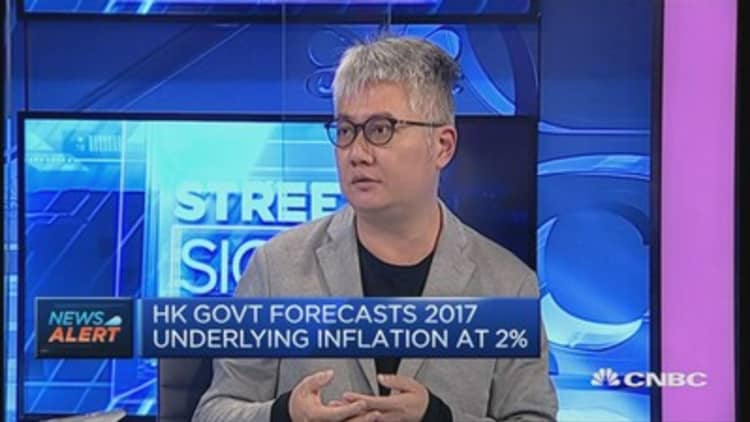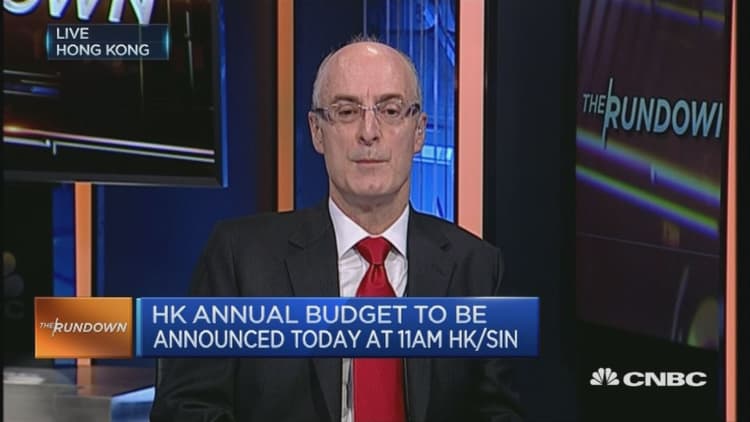
Hong Kong's economy grew at a slower pace of 1.9 percent last year and Financial Secretary Paul Chan Mo-po took steps on Wednesday in his first budget address to reverse course by cutting taxes, waiving fees for tourism firms and pledging better services.
That GDP figure was near the upper end of the government's projected band of 1-2 percent, and it topped a forecast of 1.5 percent, and below the 2015 figure of 2.4 percent.
Chan said Hong Kong expects its economy to expand 2 to 3 percent in 2017 — far more than a 1.3 percent expansion forecast by economists surveyed by Reuters.
That outlook accompanied Chan's comments on the city's budget for the year starting April 1, in which he said a "slightly improved" global economy will support Hong Kong's exports. But he added that the uncertain external environment — not in the least due to potential trade protection policies in the U.S. and China's shift to a domestic-driven growth — continues to pose risks.
"As a government, it is our responsibility to take a forward-looking perspective and promote social and economic development; it is our duty to exercise fiscal prudence and save for the unpredictable future; and it is our moral obligation to relieve people's hardship and support the needy," Chan said in prepared remarks.
For the financial year ending March 2017, Chan expects a surplus of HK$92.8 billion ($12 billion), adding to fiscal reserves expected to reach HK$935.7 billion ($120.6 billion).
The Financial Secretary, who took office in January after his predecessor resigned, announced several one-off measures on his speech including a reduction in personal salaries, corporate profits taxes and waiving property levies.
In an attempt to lift the flagging tourism industry, he introduced a one-year licence fee waiver for travel agents, hotels and guesthouses, as well as restaurants and hawkers. That would save the industry some HK$137 million ($17.7 million). The government will also allocate HK$243 million ($31.3 million) in the coming financial year to enhance Hong Kong's appeal as a tourist destination through projects such as green tours and cruise tourism.
Echoing Singapore's focus on innovation and technology, Chan also identified this area as a "new engine to power the sustainable and diversified economic development of Hong Kong." On that front, he announced the setting up of a new committee to steer development in this area.
"The tax policy unit will also explore enhanced tax deductions for [innovation and technology] expenditure," he said.
Touching on the closely-watched property market, Chan, citing preliminary estimates, said the private sector will produce an average 20,300 homes every year for the next five years — 70 percent more than the annual average in the past five years. Based on potential land supply for the coming financial year starting April 2017, there could be 32,000 units hitting the market.
The Government will also continue to increase land supply for commercial and industrial use in the next few years, Chan said.
Wrapping up his speech, the Financial Secretary said total government revenue for the new financial year is estimated to be HK$507.7 billion ($65.4 billion) and overall expenditure to be HK$491.4 billion ($63.3 billion). This works out to be a surplus of HK$16.3 billion ($21.2 billion).

A tax expert told CNBC before the start of Chan's budget speech that it is critical for the city to spend on strengthening its economy and competitiveness — or risk losing its standing as an international business center.
Speaking on CNBC's "Rundown," KPMG China tax partner Charles Kinsley cited a survey by his firm in which 45 percent of respondents said they think Hong Kong will lose competitiveness as more jurisdictions lower their tax rates to lure investors.
"Because of that, the competitiveness we're seeing today could be eroded away if Hong Kong doesn't change. That is one of the reasons people are looking at helping the tourism sector, helping the financial services to stay competitive," he said.
"But we're also expecting to see a lot more money be given back to the community in terms of elderly care, education, promoting [small and medium enterprises] and also the key focus we saw in Singapore, which is innovation, technology, intellectual property."
Kinsley, however, said there is unlikely to be large "sweeteners" and radical changes in the budget for the coming financial year starting April. This is because the budget, the last under current Chief Executive Leung Chun-ying, has to leave some flexibility for his successor.
KPMG forecasted the special administrative region to record a HK$77 billion ($9.9 billion) surplus for the fiscal year 2016-2017, exceeding the government's initial estimate of HK$11.4 billion ($1.5 billion) due to higher revenues from land sales and stamp duties.
The South China Morning Post, citing a person familiar with Hong Kong's finances, reported that Chan is expected to unveil a budget with a HK$80 billion ($10.3 billion) surplus.


